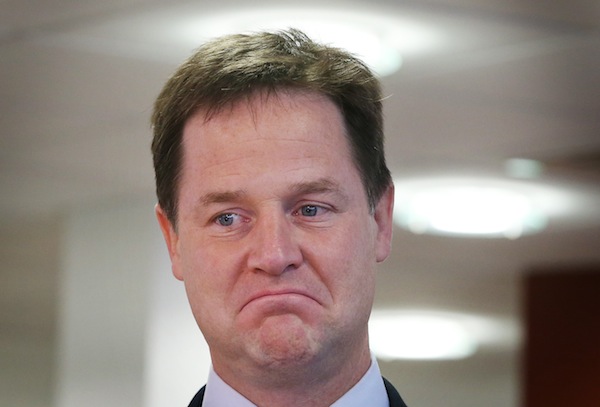Did Nick Clegg recite his entire Andrew Marr interview from memory? The Deputy Prime Minister managed to cram so many soundbites into his answers that anyone wondering what the months in the run-up to the 2015 generation election will be like will have sunk into a pit of misery at how dull and formulaic it is all going to be. Thank goodness for those trouble-making Tory MPs with their letters who are at least trying to make things a bit more unpredictable, eh?
As well as doling out his favourite lines such as ‘flirting with exit’ ‘the Conservatives have decided to swerve wildly in this direction and that’ and the slightly clumsy ‘we are, indeed, in it all together’, Clegg was trying very hard indeed to keep himself equidistant from both Labour and Tory positions on post-2015 book-balancing. He used the striking line ‘a sort of Chinese-style family policy’ to describe Conservative proposals to limit child benefit to just two children in a family, but wouldn’t start ruling out benefit cuts, saying ‘I will look at all proposals’.
Here’s his quote on benefits:
‘I think it’s wholly unfair. You can’t say as the Conservatives appear to be saying at the moment that we’re all in it together, and then say the very wealthy won’t make any additional contribution to their taxes if there is a conservative government after 2015 in the ongoing effort of balancing the books. We’re not even going to ask, because they don’t appear to have even suggested this, that very wealthy people who are retired, who have benefits, TV licence, winter fuel payments and so forth, paid for by hard-pressed taxpayers, we’re not even going to ask them to make a sacrifice, the Conservatives appear to be saying only the working age poor will be asked to make additional sacrifices to fill the remaining black hole in our public finances. My view is that is unbalanced, it is unfair, by the way, it doesn’t have much economic logic either. Any mainstream economist I’ve ever listened to says you’ve got to have a mix of yes, spending reductions, the bulk of the spending reductions, yes welfare reform, I’m no slouch on welfare reform, there are lots of welfare reforms we’ve introduced. But also the contributions from those with the broadest shoulders. I’ve a very simple view, you’ve got to start at the top and work down, not start at the bottom and then work up… ‘You can if you want go through a whole shopping list of ideas. I personally for instance think that certainly when it comes to the free tv licence the winter fuel payments for very wealthy pensioners there’s a case to say that some very wealthy pensioners shouldn’t receive those benefits. The Conservatives have talked for instance… I will look at all proposals but some of the ones I’ve seen floated for instance the idea of a two-child policy… well I’m not in favour of penalising the young. I’m not in favour of a sort of Chinese-style family policy saying that the state says well it’s ok to have two children, it’s not ok to have three children, because remember this is…’
But while he is clearly wanting to suggest that a great burden fall on the wealthy and older voters rather than ‘penalising the young’, Clegg still doesn’t want to rule out further benefit cuts. In that sense, he isn’t going as left as some might think. And he had memorised lines on Labour which attacked the party’s economic credibility, just as he has done in the past:
‘I think the fundamental problem for the Labour party, I think they’ve become an effective sort of campaigning opposition party, they pick up an issue here, they pick up an issue there, they go round pointing at things saying “ooh, they’re terribly expensive” and, you know… sure, sure, I’m not, listen, it’s no wonder that opposition politics is easy when you’ve got a government which is having to do some of the most painstaking and unpopular spade work to clear up the mess left behind. Of course, I understand that. But, at the end of the day, I think until they demonstrate more clearly that they’ve understood the lessons of 2008, that what went wrong, their responsibility for it… at the moment I don’t think people trust the Labour party with their money because they so, they messed up on that in such a spectacular fashion in the past, they took their eye off the ball as far as regulating the banks is concerned, they spent money when they shouldn’t have spent money, they didn’t put money aside when they should have done, and that’s a very important point because unless you have stable, strong public finances, you don’t have the foundations upon which prosperity can be built.’
But the point is, as Andrew Marr said to Clegg, the two Coalition parties have run out of things that they agree on and there is very little space for them to go further. Which is why the next few months of Coalition politics at least look quite dispiritingly dull.







Comments